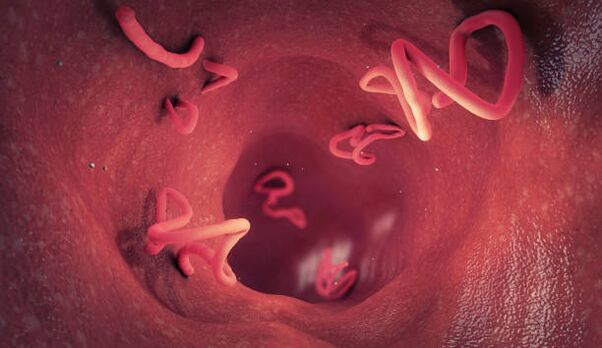Worms are worms that lead a parasitic lifestyle in the body of their host - a person. Age does not matter. Both adults and children are equally susceptible to infection. The classification of helminthiasis is very extensive, especially in countries with hot climates.

There are 3 classes of parasitic worms:
- round (nematodes) - pinworms, roundworms;
- Tape (cestodes) - pork tapeworm, beef tapeworm, echinococcus;
- Flatworms, leeches (trematodes).
The most common worms in children are pinworms, which cause enterobiasis. These helminths are small, on average up to 1 cm, white-gray with a curved body. The place of localization of these parasites is the large intestine, but they can also invade the lower parts of the small intestine. Pinworms multiply on the skin near the anus. At night, female pinworms get out to lay eggs in the folds of skin and often invade the labia of girls, which ends with infectious diseases of the genitals. In total, these helminths live about 1-1, 5 months. The process of self-infection in a child can cause the malaise to persist for many years. Parasites can be detected in the feces with the naked eye.
Roundworms are another type of worm that are most common in children. Of a characteristic species, reaching a length of 15 cm, these nematodes settle in the lumen of the loops of the small intestine and move in the direction of the moving lump of food. Roundworms very rarely end up in the faeces. Females regularly shed eggs, which can be found in fecal analysis. However, if they were not found during the study, it does not mean that the child is not infected. The life cycle of a roundworm can last several years.
The reasons
The baby's curiosity is recognized by his fingers, the child gets to know the world, actively touches everything that comes under his arm and immediately pulls it into his mouth for strength and taste. In this way, pinworm eggs safely get into the digestive tract of their future little host.
A child becomes infected with the eggs of worms from the surface of unwashed fruit when drinking contaminated water. Very often, infection occurs when communicating with animals or when playing in the ground, sandpit, where cats and dogs are happy to solve their physiological problems. Often, after a walk, children do not wash their hands, and all the dirt gets into their mouths along with parasitic eggs.
Symptoms
If a child has been infected with a large number of eggs from parasitic worms, there can be severe deterioration within a few days. In milder cases, the first symptoms of invasion appear after several weeks or even months. Much depends on the child's immunity. He can cope well with parasites and inhibit their development. But gradually the defenses are reduced, and helminths infect the body, which leads to serious problems.
The first signs are symptoms of intoxication. The vital activity of worms is accompanied by the release of a large number of animal toxins that can poison the child's body. In the intestines, parasitic worms use nutrients, as a result of which the baby gradually lacks proteins, carbohydrates, fats and vitamins.
The child has:
- Emaciation,
- Pallor of the skin,
- Weakness, frequent dizziness,
- Increase in body temperature, headache,
- bad dream,
- Tears,
- depressed mood.
Intestinal discomfort manifests itself - constipation, loose stools, growling and pain in the abdomen, nausea and vomiting, painful sensations in different parts of the abdomen, and gas. The disease can be accompanied by allergic conditions: itching, rashes, cough, inflammation of the mucous membranes of the respiratory tract. The weakening of immunity leads to the addition of infectious diseases.
Diagnosis and treatment
Diagnosing helminthiasis in feces is quite difficult. This is because roundworm eggs or pinworms do not appear in the feces every day, and the technique of smear microscopy from analysis requires great care. To increase the reliability of the analysis of feces for eggs from worms, it is advisable to take at least 3 days in a row.
If there is an increased risk of infection with worms (contact with animals, the child playing on the floor or in open sandpits, the child's habit of putting things in their mouths, biting their nails or licking their fingers, etc. ), it is recommended to get oneto undergo an in-depth examination, which in addition to the triple fecal analysis also includes special blood tests for the detection of helminth antibodies.
With allergic manifestations of unknown origin, an increase in the number of eosinophils in the blood test, persistent intestinal dysbiosis, it is advisable to donate blood for the determination of immunoglobulins of class E (Ig E and G) against roundworms and other helminths. You can look for worms in pets.
Taking into account all the indirect signs and anamnesis, the doctor may recommend antihelminth therapy without direct evidence of the presence of worms in the child, when other pathologies that cause similar clinical manifestations are excluded from all family members in order to avoid the formation of a focus of infectioneach other with helminth eggs. In this situation it is also necessary to step up hygiene measures, in particular to boil and iron bed linen and personal laundry on both sides.
























